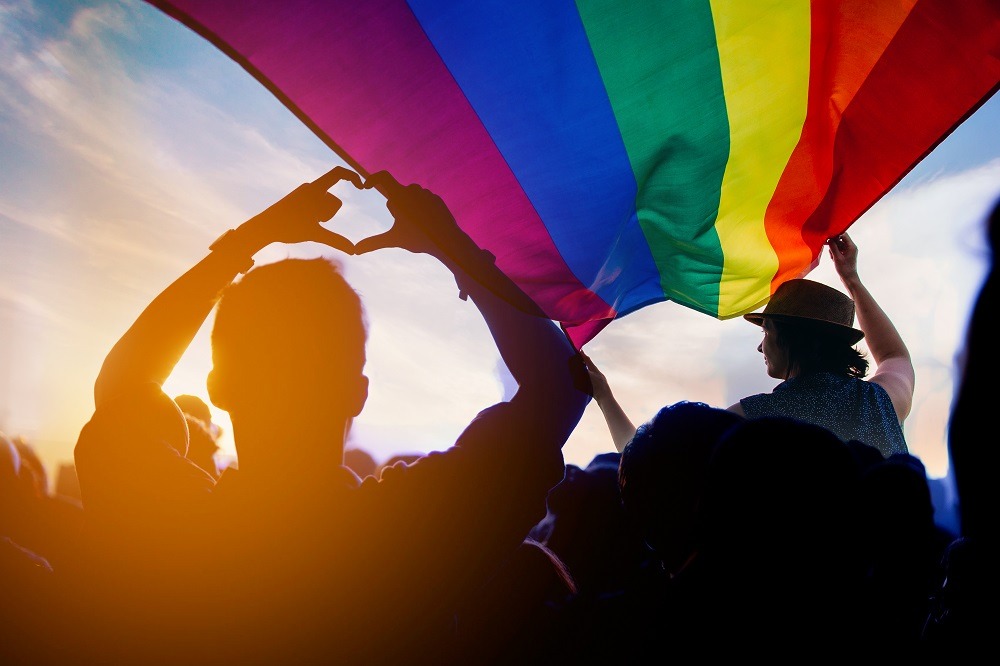Bumpy road in promoting LGBT rights

Participants hold a large rainbow flag as they join in the annual pride parade. (Angyalosi Beata / Shutterstock.com)
This article was originally published in The Jakarta Post's print edition on May 20, 2017, with the title "Bumpy road in promoting LGBT rights".
Marguerite Afra Sapiie
The Jakarta Post
Jakarta / Sat, May 20 2017
In a country where religion matters and conservatism continues to permeate society, the movement to promote equal rights for lesbian, gay, bisexual and transgender (LGBT) people still has a long way to go.
Indonesia is ranked third among countries that highly regard religion, with 97 percent of people in the country saying religion is very important to them, a 2015 report by the United States-based Pew Research Center said.
Even though the majority of Indonesians are moderately tolerant, when it comes to LGBT issues, people are likely to be intolerant, said Anick H. Tohari, who promotes religious and faith freedom.
“The main enemy of LGBT people in the context of promoting their rights is religion. So in a place where religion is highly regarded, the majority reject LGBT people from a religious point of view,” Anick told a discussion held to commemorate International Day Against Homophobia and Transphobia on Thursday.
A survey on tolerance carried out by Saiful Mujani Research and Consulting (SMRC) in November 2016 found that from 1,000 respondents, 16.6 percent cited the LGBT community as the group they disliked the most, second after the Islamic State (IS) group with 25.5 percent.
A similar survey by Wahid Foundation last year also revealed that the LGBT community was the minority most disliked by Indonesian Muslims, who account for nearly 90 percent of the country’s population.
The survey said 26.1 percent of 1,520 Muslim respondents nationwide disliked LGBT people, while 16.7 percent of them disliked communists.
“Although religious figures will likely speak against violence when intolerant groups attack the LGBT community, they will always say that supporting the LGBT community goes against religious teachings. The issue is highly sensitive,” Anick said.
Last year was seen as a highly threatening year for the LGBT community, as there was an unprecedented flood of anti-LGBT sentiment across the country, raising concerns that homophobia was on the rise.
Many high-ranking government officials joined in, making inflammatory statements against the minority group, saying LGBT people “corrupted the morals of the nation” and that they were “deviants and a danger to adolescents.”
Ryan Korbarri, an activist with rights group Arus Pelangi, said even though direct violence against the LGBT community at the national scale had gradually decreased from last year, the effects of anti-LGBT people slurs remained, especially at the local level.
He said transgender people had been the most affected, as they experienced difficulties in finding jobs or places to rent.
“In regions where religious fundamentalism is rising, violence against the LGBT community is also high,” Ryan said, adding that West Java and Aceh were among the most unfriendly regions to the LGBT community.
National Commission on Violence Against Women (Komnas Perempuan) data revealed there were 26 cases of violence based on sexual orientation, gender identity, expression and body reported to the commission in 2016.
Human rights activists, however, have not lost hope that the LGBT movement, one of the newest scopes in pro-democracy movements, will make strides in the country.
All-Indonesia United Workers Confederation (KPBI) leader Ilham Syah said the LGBT community should integrate with other pro-democracy movements, so that people could have a better understanding of LGBT issues and lend their support to the movement.
Dhyta Caturani from Gema Demokrasi said the LGBT community should also end the stigma it placed on itself and that it should interact more with activists representing other pro-democracy movements.
